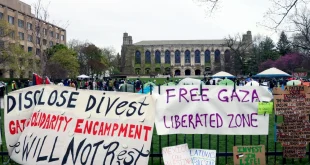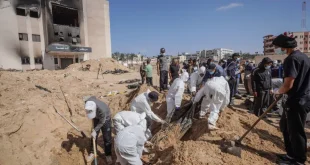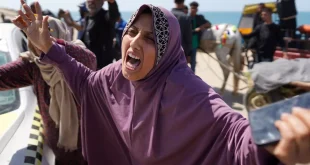Everything is in ruins and the spirit of Ramadan has been reduced to a mere shadow of its former self
For the 2.2 million Muslims in Gaza, Ramadan has historically been a time of joyous social gatherings, spiritual reflection, faith renewal, and cherished family reunions.
However, over the past decade, recurring Israeli wars on the Strip have cast a dark shadow over this once-vibrant tradition. The ongoing genocidal assault, which has claimed more than 32,000 Palestinian lives and has laid waste to Gaza, made this a most devastating month.
Even when I encounter passersby on the street, I am unable to politely wish them, “Ramadan Kareem”.
Such greetings feel inappropriate and almost shameful, as all the jubilant celebrations of Ramadan have been replaced by quiet mourning – punctuated only by the echoes of war, grief and hardship.
Last year, I was delighted to secure a job with a decent salary for the first time in my career. Filled with a sense of abundance, I surprised each of my 22 nieces and nephews with a colourful lantern, or “fanoos”, to usher in the holy month.
Reduced to ruins
Under “normal” conditions – as normal as they could be during a blockade – the weeks leading up to Ramadan are filled with anticipation and preparation.
The vibrant nighttime streets of Gaza have fallen into sombre silence. Where there was once life, there is now rubble
The streets of Gaza would come alive as households and businesses adorned their balconies and storefronts with lanterns to welcome the holy month. I remember my sisters-in-law helping me decorate the balcony of our home with these small lanterns.
This cherished tradition, led by young mothers and enthusiastic youth, created a vibrant atmosphere throughout the neighbourhoods. The sight of Gaza’s illuminated streets, powered by generators, solar panels, or even sporadic electricity, would fill my heart with joy.
But this year, Ramadan is a sad month.
The vibrant nighttime streets of Gaza have fallen into sombre silence. Where there was once life, there is now rubble. The joyous sounds of children playing have been replaced by the heart-wrenching cries of those trapped beneath it.
Follow Middle East Eye’s live coverage of the Israel-Palestine war
On the first day of Ramadan, I ventured through the streets in search of some semblance of the past. The scant hope I had instead became a painful realisation of just how much we have lost.
Only a few stalls remained in what used to be lively outdoor markets – offering meagre quantities of lemons, eggplants, tomatoes, and homemade laundry soap. The faces I encountered were filled with grief and despair. At that moment, I couldn’t help but weep for the loss of those cherished memories.
The once-colourful lights and lanterns that used to adorn the roads have been replaced by the harsh flashes of bombs and utter destruction.
Mosques, once crowded with worshippers, either stand empty or lie in ruins. Imams now appeal to individuals to worship within the confines of their own homes or makeshift tents.
And yet the devastation extends beyond the visual landscape.
The atmosphere of Ramadan nights, filled with Tarawih prayers in mosques and Quranic recitation, has been replaced by the sounds of explosions from Israeli bombs.
The aromas that permeated Gaza’s streets and shops are now distant memories. The bustling markets, like al-Zawya, Gaza’s oldest market, were stocked with buckets of sour pickles and olives, cartons of various dates, pyramids of spices, dried fruits, jams, and other colourful food items.
Everything has been reduced to ruins.
‘Even in Ramadan’
When I was young, I used to navigate the narrow and cramped alleys of the Deir al-Balah refugee camp on my walk home from school.
The air was filled with the sounds of women cooking, accompanied by the clattering of spoons and cooking utensils. Each house emitted a distinct aroma unique to the meals being prepared inside.
My dear friend, Hamda, who recently was tragically killed in an air strike on her home along with her husband, could identify dishes based on the fragrance that each home was emitting during the preparations, as we walked together towards our homes. I cherished the hour leading up to sunset and the Maghrib prayer.
Today, people in Gaza fast through iftar not out of choice, but because they lack food and water
When the first day of Ramadan would come, many of us never had to think of what to cook for iftar, as the answer was evident: molokhia. This thick and flavourful stew, made from the leaves of the jute mallow plant, had always served as the traditional “opener” for Ramadan meals in Gaza. Like other Palestinian mothers and grandmothers, my mother believed that the vibrant green colour of molokhia instilled optimism and brought good fortune during the month.
This year is different. We no longer have the luxury of choice when it comes to our meals. Instead, we rely on a few cans of food received in aid parcels.
While most people fasting around the world may experience headaches and fatigue from the lack of food and caffeine, this year we did not feel the exhaustion from that first day of Ramadan since we have already been enduring food deprivation and a lack of basic necessities for months.
Today, people in Gaza fast through iftar not out of choice, but because they lack food and water.
My brother, who works at a hospital, remarked: “We have been fasting for five months, so I do not know if we will get a headache on the first day.” We did not.
Our first suhour was accompanied by Israeli air strikes and artillery shelling in Deir al-Balah. My mother sighed: “Even in Ramadan.”
We used to treat ourselves to qatayef, a beloved dessert popular in Ramadan that is no longer available. One kilogram of sugar, which used to cost only 8 NIS ($2), is now a staggering 85 NIS ($23).
The spirit of Ramadan in Gaza has been reduced to a mere shadow of its former self. Sprawling banquets and gatherings have given way to canned meals.
Families no longer gather in celebration but in mourning.
The destruction of homes, markets, schools, the loss of loved ones, and the disruption of daily life have left us grappling with unimaginable pain and loss.
For more than five months, Gaza has endured massacres, disease, starvation, displacement, expulsion and thirst. I desperately waited for Ramadan in the hope that this sacred month would be different from its predecessors. However, the violence and brutality of the situation have not ceased or lessened with the arrival of Ramadan.
We used to recite a prayer in which we would ask God for Ramadan to arrive without losing any of our loved ones.
However, this Ramadan, we have lost many, many friends, family members, and relatives. We lost homes. We lost our lives. We lost memories. We have lost everything.
This month, we are fasting from everything, whether it is food, talking, smiling, or spiritual experiences. Only grief and despair are in abundance.
The views expressed in this article belong to the author and do not necessarily reflect the editorial policy of Middle East Eye.
Post Disclaimer | Support Us
Support Us
The sailanmuslim.com web site entirely supported by individual donors and well wishers. If you regularly visit this site and wish to show your appreciation, or if you wish to see further development of sailanmuslim.com, please donate us
IMPORTANT : All content hosted on sailanmuslim.com is solely for non-commercial purposes and with the permission of original copyright holders. Any other use of the hosted content, such as for financial gain, requires express approval from the copyright owners.
 Sri lanka Muslims Web Portal Diversity and Inclusiveness
Sri lanka Muslims Web Portal Diversity and Inclusiveness




